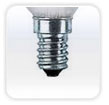What Are the Different Cap Types?

B15 (Small Bayonet Cap)
15mm Small Edison Screw B15/SBC lamp base

BC
22mm B22/BC lamp base

E12 (Small Edison Screw)
12mm SES (Small Edison Screw)/E12 lamp base

E14 (Small Edison Screw)
14mm SES (Small Edison Screw)/E14 lamp base

E17 (Small Edison Screw)
17mm SES (Small Edison Screw)/E17 lamp base

E26 (Edison Screw)
26mm ES (Edison Screw)/E26 lamp base

E27 (Edison Screw)
27mm ES (Edison Screw)/E27 lamp base
 E40 (Giant Edison Screw)
E40 (Giant Edison Screw)
40mm GES (Giant Edison Screw)/E40 lamp base

G4
G4 (4mm Apart) lamp base

GU10
GU10 lamp base

GX5.3
GX5.3/GU5.3 lamp base

G6.35
G6.35/GY6.35 (6.35mm Apart) lamp base

G8.5
G8.5 lamp base

R7s
R7s/RX7s lamp base
Bulb Caps – What is the difference?
The history of bulb cap designs dates back to the time period covering the end of the 19th century and the beginning of the 20th century. In essence, the difference in design comes down to the varying availability of the products in Europe (where the Bayonet design was prevalent) compared to the availability in America (where the Edison Screw was most popular).
Types of bulb cap:
-
Bayonet Cap (BC)
Two types of Bayonet Cap were developed in the UK throughout the 1870s. A powerful ‘three pronged’ version was produced for use in industry and street lighting. A less powerful domestic version was also distributed, consisting instead of two prongs. The pronged design provided a sturdy mount that was not able to shake free as a result of external vibrations. -
Edison Screw Cap (EC)
The Edison Screw was first licensed in America in 1909, having become the most popular choice of cap in both domestic and industrial settings throughout 1908. Although the screw design is known to shake free when exposed to prolonged industrial vibrations, EC presents a very easy to use option in home lighting owing to the simple and effective design.
Both Bayonet style caps and Edison Screw caps have since become the standard choice of light bulb cap around the globe.
Which bulb cap do I need?
In Europe and America, available lighting fixtures are most likely to be either Bayonet or Edison Screw. Close attention should be paid to the size of the light fixture, as both types of bulb cap come in at least least two popular sizes.
Common types of cap sizes:
-
Standard Bayonet Cap
This light fixture is 22mm in diameter. The cap size is stylised as B22, Ba22d or BC -
Small Bayonet Cap
This light fixture is 15mm in diameter. The cap size is stylised as B15, Ba15d or SBC -
Standard Edison Screw Cap
This light fixture is 27mm in diameter. The cap size is stylised as E27 or ES -
Small Edison Screw Cap
This light fixture is 14mm in diameter. The cap size is stylised as E14 or SES
Pin and push style caps
A popular cap design among LED bulbs is Pin and Push, consisting of two parallel pins. Again, this type of cap comes in different sizes specific to the light fitting. The most popular sizes are known as GU10 and GZ10. Light fittings designed for the GU10 cap are specially shaped to allow access to this type of cap, but not the GZ10. Conversely, GZ10 fittings are designed to allow access to both GU10 and GZ10 style caps.
